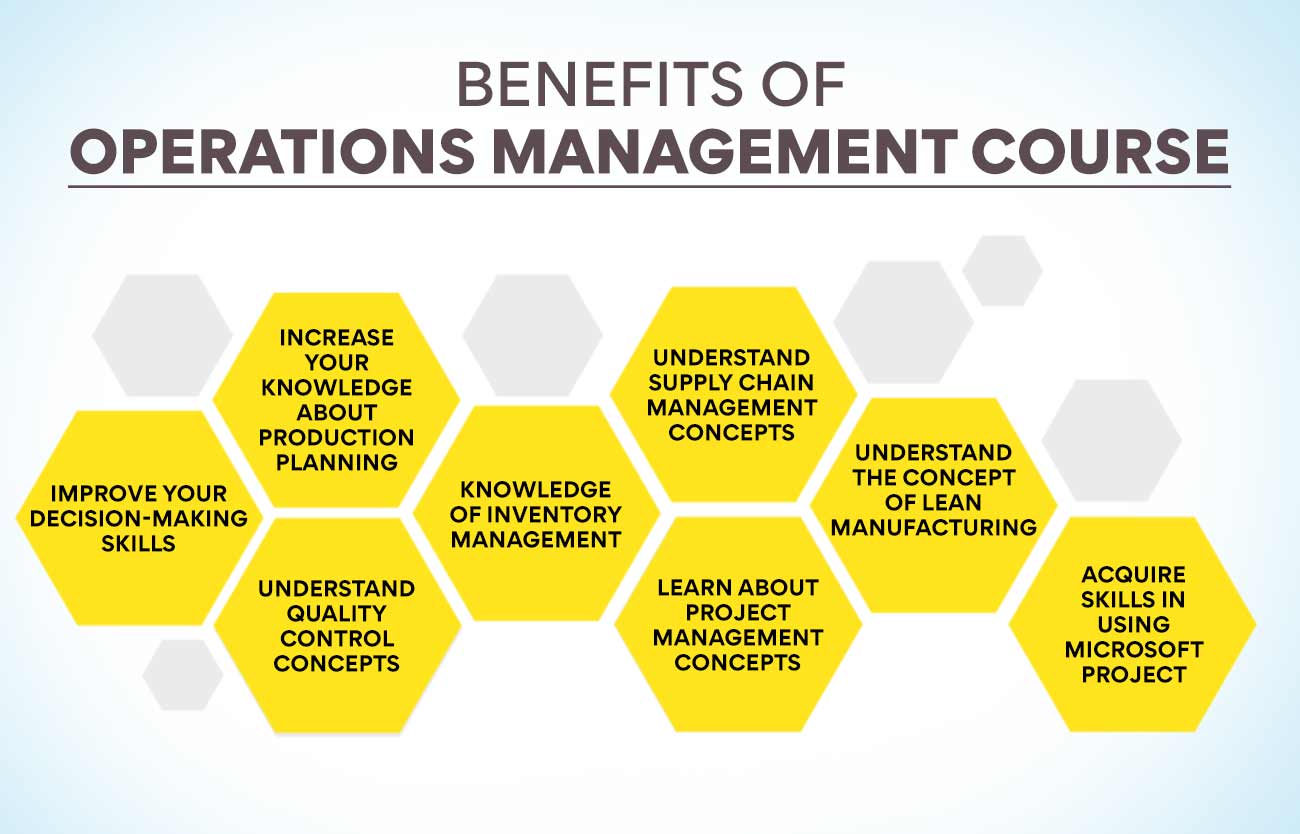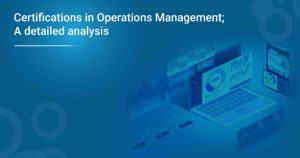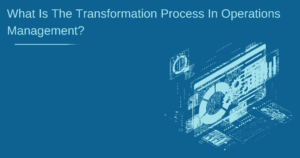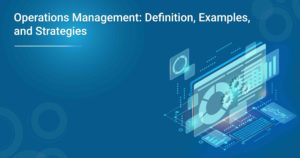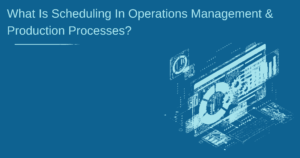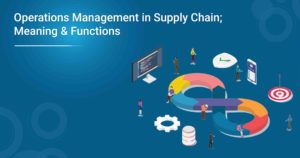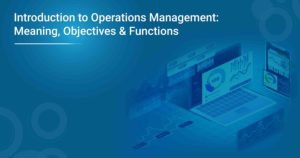When it comes to operations management, various certifications can help validate your skills and enhance your career prospects. With an abundance of options available, deciding which is right for you can take time. This blog post will provide a detailed analysis of some of the most popular certifications in operations management to make a well-informed decision about the best for your needs.
We will cover topics such as the requirements for each certification, the benefits of obtaining one, and the expected salary increase associated with each credential.
Benefits of Operations Management Course
Operations management is a field that is concerned with the production of goods and services. It is responsible for planning, coordinating, and controlling the resources required to produce goods and services. Operations management aims to ensure that the production process is efficient and effective.
The operations management course will offer you the knowledge and skills necessary to manage the production process effectively. You will learn about various aspects of operations management, such as production planning, quality control, inventory management, and supply chain management. In addition, you will also understand how to use different tools and techniques to improve the efficiency of the production process.
By taking an operations management course, you will be able to:
1) Improve your decision-making skills: The course will teach you how to make better decisions about various aspects of the production process. You will learn how to recognise and solve problems quickly. In addition, you will also learn how to use different tools and techniques to support your decision-making process.
2) Increase your knowledge about Production Planning: The course will give you a thorough knowledge of production planning. You will learn about different types of production plans, such as master production schedules (MPS), material requirements planning (MRP), capacity planning, and aggregate planning. In addition, you will also understand how these plans are used in conjunction with one another to optimise the production process.
3) Understand Quality Control concepts: Quality control is one of the most critical aspects of operations management. The course will teach you different quality control concepts, such as Six Sigma, statistical process control (SPC), and total quality management (TQM). In addition, you will also learn about different tools and techniques that will enhance the quality of the products and services you produce.
4) Knowledge of Inventory Management: Inventory management is another essential aspect of operations management. The course will teach you about different methods of inventory management, such as just-in-time (JIT) inventory, Economic Order Quantity (EOQ), and Periodic Review Inventory (PRI). In addition, you will also learn about different techniques that can be used to optimise the inventory levels in your organisation.
5) Understand Supply Chain Management concepts: The course will give you a detailed understanding of supply chain management. You will learn about different types of supply chains, such as Make-to-Stock (MTS), Make-to-Order (MTO), and Engineer-to-Order (ETO). In addition, you will also gain an understanding of how these supply chains are managed and coordinated.
6) Learn about Project Management concepts: Operations management is also responsible for the management of projects. The course will teach you about different project management concepts, such as project initiation, planning, execution, monitoring and controlling, and closure. In addition, you will also gain an understanding of how to use different tools and techniques to manage projects effectively.
7) Understand the concept of Lean Manufacturing: The course will provide you with a better understanding of Lean Manufacturing. You will learn about Lean tools and techniques, such as value stream mapping, 5S, and Kanban. In addition, you will also understand how these tools and techniques can be used to improve the efficiency of the production process.
8) Acquire skills in using Microsoft Project: Microsoft Project is a software application commonly used in operations management. The course will teach you about different features of Microsoft Projects, such as task scheduling, resource allocation, and cost estimation. In addition, you will also gain an understanding of how to use Microsoft Projects to create and manage production plans.
Also Read: What Is The Scope Of Operations Management?
How To Select The Best Certifications For Operations Management?
When selecting the right certification for your career prospects in operations management, you need to take a few key steps. Here is an approach to help you make the greatest decision for your future.
1) Research potential certifications: Spend time researching available operations management certification programs. You should find out what qualifications and experience each program requires and consider any associated fees or costs.
2) Analyse your career needs: Think about the specific skills and knowledge you want to acquire for your operations management role. Make sure that whatever certification program you choose matches up with these requirements.
3) Choose the best fit: Now it’s time to ascertain which certification is best for you. Once you have narrowed down your options, weigh up the pros and cons of each one to determine which will give you the ideal return on your investment.
4) Consider accreditation: Finally, ensure that your chosen certification is accredited and recognised in your chosen field. It will ensure that employers take your new credentials seriously.
5) Consider Their Syllabus: Review their syllabus in detail before committing to a certification program. It will help you assess whether the course suits your desired career goals.
6) Look into additional resources: Once you have decided on a certification program, look into any additional resources they may offer.
It could include online training materials, study groups, or mentorships.
7) Ask for advice: Don’t forget to reach out to mentors, colleagues and other professionals in your network who may have experience with certifications. Doing so will help you make an informed decision tailored to your career needs.
8) Take the plunge: You’ve done your research, considered all the options, and chosen what you believe is the best certification program. It’s time to take action and make it happen!
By following these steps, you should be able to select a certification that will help advance your career in operations management.
Certifications in Operations Management: What Are The Key Highlights of An Operations Management Course?
An operations management course will cover various topics related to the organisation, planning, and control of business processes. Generally speaking, it will cover the following topics:
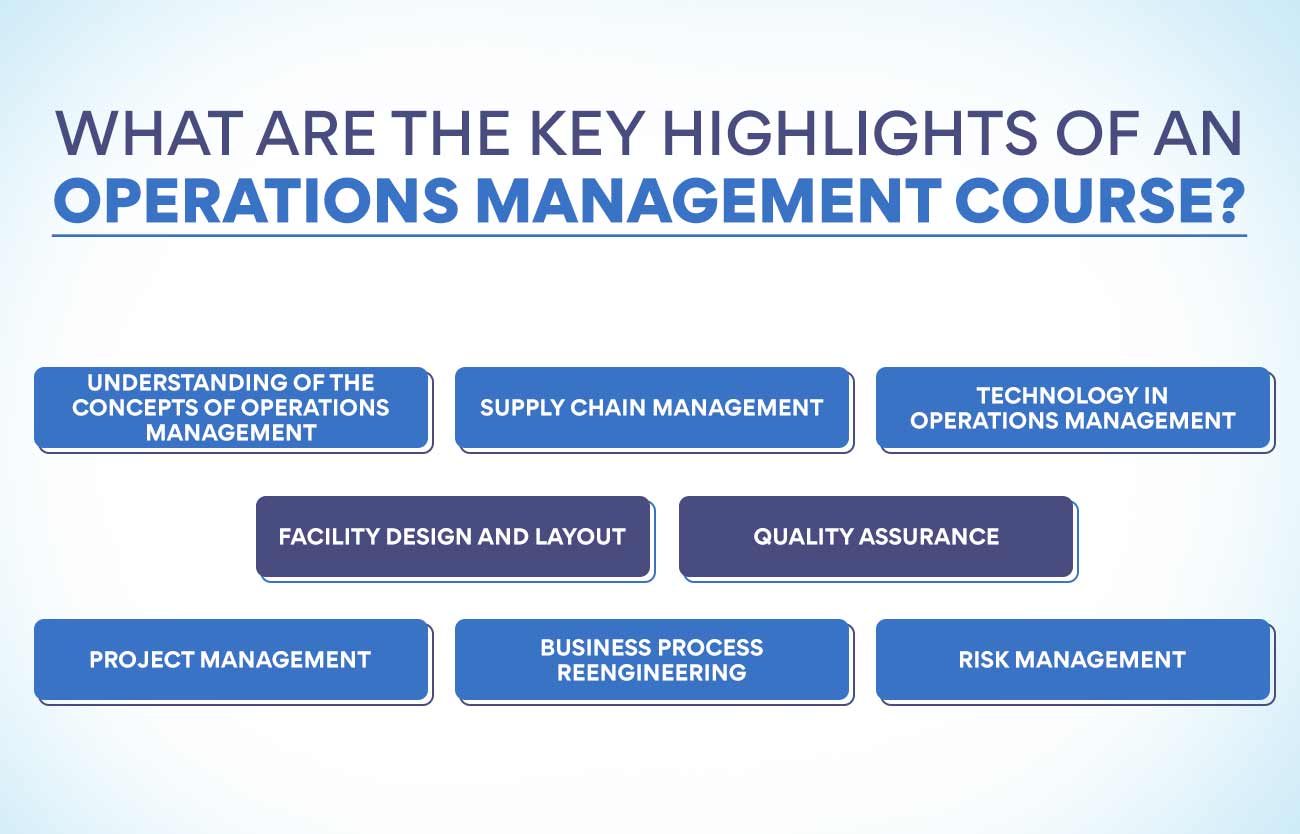
Understanding of the concepts of operations management: This will include an overview of the role of operations management, concepts like supply and demand, lean production, and total quality management.
Supply chain management: You will get an understanding of supply chain management strategies and how to identify opportunities for optimising the flow of materials, information, and services.
Technology in operations management: You will learn about the use of technology in operations management, such as robotics and automation, artificial intelligence, and data analytics.
Facility design and layout: You will get an in-depth knowledge of how to design an efficient layout for facilities, including space maximisation, ergonomics, and layout principles.
Quality assurance: You will learn about quality management systems, methods for controlling quality, and how to identify defects and their causes.
Project management: You will learn how to plan, manage, and monitor projects effectively so that they run according to schedule and budget.
Business process reengineering: It will give you an idea to identify potential areas for improvement in existing processes, develop new processes, and manage change.
Risk management: You will get an understanding of risk factors that affect operations, develop mitigation strategies and contingency plans, and manage risk.
After completing the course, you can apply what you have learned in an operations management context. You can identify and solve problems, analyse data, make decisions, and optimise operations. You’ll also better understand the influence of operations management on the overall performance of an organisation.
What Are The Benefits of Taking A Operations Management Certification?
There are many reasons to consider getting an operations management certification. For one, it can greatly improve your career prospects and earning potential. Additionally, a certification can help you develop new skills and knowledge in operations management.
Some specific benefits of taking an operations management certification include the following:
Improved job prospects and earnings potential: A certification in operations management can help your resume stand out when applying for jobs. It shows employers that you have the requisite skills and expertise to be successful in the role. Additionally, certified operations managers earn higher salaries than their non-certified counterparts.
Develop new skills and knowledge: A operations management certification will give you a solid foundation of knowledge in the field. You’ll learn about supply chain management, project management, quality control, and more. This knowledge can improve your current job performance or prepare you for a new role in operations management.
Flexibility and portability: A certification is portable, meaning employers across industries will likely accept it. It makes it a valuable asset if you ever decide to change careers or pursue opportunities in other industries.
Additionally, many certifications can be completed online or through evening/weekend courses, making them convenient for busy professionals.
Also Read: What Are The Objectives Of Operations Management?
What Is The Eligibility Criteria For A Career In Operations Management?
The eligibility criteria for a career in operations management vary depending on the individual business and its needs. Generally, a bachelor’s degree in business management, operations management, accounting or finance is required. Additionally, a master’s degree in the same field may be preferred by some employers.
In some cases, relevant professional experience in the field of operations management may be accepted by employers as an alternative to a degree.
Aside from educational qualifications, employers may also look for specific skills and qualities, such as strong organisational and problem-solving skills, decision-making abilities and excellent communication skills. Knowing the latest technology and trends in the field may also be beneficial.
Finally, a strong track record of successful project management experience is often essential to secure a position as an operations manager. Demonstrating how you have managed projects within budgets and deadlines will prove invaluable when applying for jobs.
Skills you Need To Become An Operations Manager
To become an operations manager, you must have specific skills. Here are 10 of the essential skills you need:
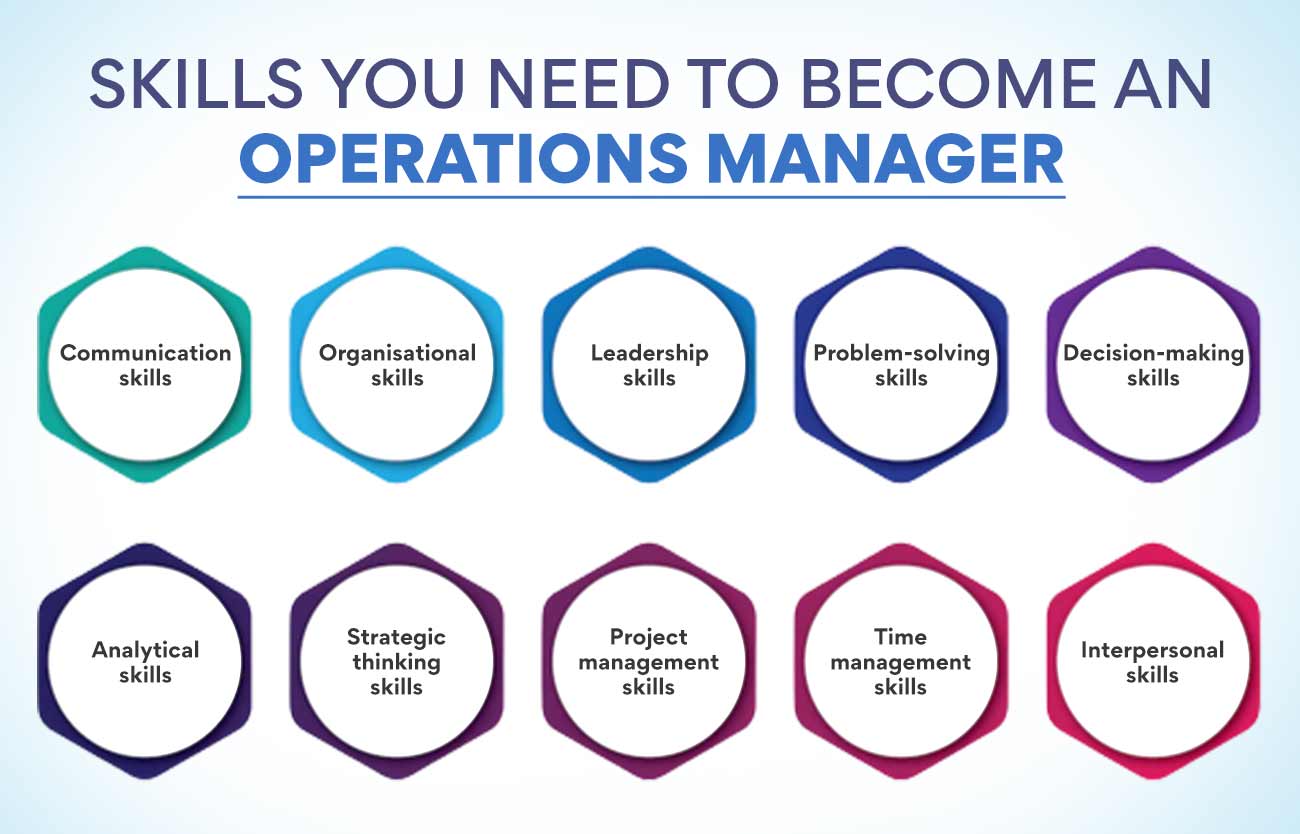
- Communication skills: Operations managers must communicate clearly and effectively with their team members. They need to be able to give instructions and provide feedback.
- Organisational skills: Operations managers need to be organised and efficient. They need to be able to plan and execute tasks promptly.
- Leadership skills: Operations managers must lead and motivate their team members. They need to be able to set goals and inspire their team to achieve them.
- Problem-solving skills: Operations managers must identify and solve problems quickly and efficiently. They must think on their feet and come up with creative solutions.
- Decision-making skills: Operations managers must make decisions quickly and confidently. They need to weigh all the options and make the best decision for the company or organisation they are working for.
- Analytical skills: Operations managers need to analyse data and information quickly and accurately. They must spot trends And patterns And use this information To improve operational efficiency.
- Strategic thinking skills: Operations managers must think strategically and long-term. They need to be able to plan for the future and make decisions that will benefit the company or organisation in the long run.
- Project management skills: Operations managers must manage projects effectively. They need to be able to create project plans, assign tasks, and track progress.
- Time management skills: Operations managers must manage their time wisely. They need to be able To prioritise tasks and complete them within the allocated time frame.
- Interpersonal skills: Operations managers must build good relationships with their team members. They must motivate and inspire their teammates to work together towards common goals.
Certifications in Operations Management: Career Paths You Can Take After Operations Management Certifications
An operations management certification can help you pursue various career paths. Here are some of the most popular options:
- Project manager: A project manager will oversee the planning, execution, and completion of projects. They must have strong organisational skills and communicate effectively with all members of a project team.
- Operations analyst: An operations analyst is responsible for analysing an organisation’s business processes and identifying areas of improvement. They must have strong analytical and problem-solving skills.
- Business process consultant: A business process consultant helps organisations optimise their business processes. They must have a deep understanding of best practices in operations management and be able to communicate effectively with clients.
- Quality assurance manager: A quality assurance manager ensures that products and services meet all quality standards. They must have strong attention to detail and effectively manage teams of quality assurance professionals.
Conclusion
For a new and exciting operations management career, obtaining your certification is the best way to get started. With so many different certifications available, it is crucial to research and choose the best fit for your needs. We hope this article has helped you give an understanding of the types of certifications available and how they can benefit your career.
If you want to learn the nitty-gritty of operations management, check out our course Advanced Certificate in Operations, Supply Chain and Project Management, which will train you to deal with various managerial issues.
Enrol Now!
More Information:
What is Operations and Supply Chain Management (OSCM)?
Operations Management: Syllabus, Courses, and Certifications
What Is The Transformation Process In Operations Management?
What Is Scheduling In Operations Management & Production Processes?







